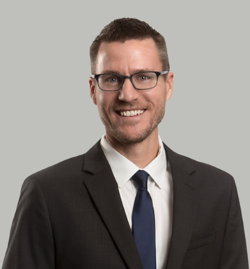Maryland Carey Law is incredibly proud of its amazing network of alumni throughout the world. Since graduating in 2006, Jim Heinen, Jr. has risen to prominence as Partner and Intellectual Property Practice Group Leader at Armstrong Teasdale in St. Louis, Missouri. We sat down with James and asked him some questions about his life, his time at Maryland Carey Law, and his career in IP law.
Why did you choose Maryland Carey Law?
My wife. Beth and I were dating when we graduated from Miami University, and we looked at areas of the country where we could be together. Beth was accepted into George Mason University’s Ph.D. program, and so I applied to Maryland because I knew it was a good school and I wanted to be as close to her as possible. I was wait-listed at Maryland, and I still recall the day I received my admissions letter. Beth and I opened the letter together on a campus bench in Oxford, saw that I got in, and we made our decision to head out east together.
What attracted you to IP Law?
While at Miami, I majored in chemistry. I had a summer internship with The Sherwin-Williams Company at their headquarters in Cleveland, OH. During the internship, I made paint and deck stains from scratch in a lab every day. I realized that while it was an enjoyable summer job, I did not want to be in a lab for the rest of my career. I then started looking into alternative career paths for chemistry majors. An employee from Procter & Gamble came to Miami to speak to the chemistry majors about patent law, and that sounded like an interesting career to me. I took as many law classes as I could my senior year and decided to go for it. I really liked using my science background in combination with the law. As a patent attorney, you get to see the cutting edge of technology on a daily basis, which is always exciting, and you never stop learning.
How has graduating from Maryland Carey Law helped in your career?
Maryland Law helped shape me in a number of ways. First and foremost, the law school did a great job of teaching me how to be a professional. I found that the courses were difficult but fair. If you have the discipline to do the homework and put in the hours to study, you will do well in school. I have found that those skills translate seamlessly into the legal profession. I’ve used the work habits I learned at Maryland every day in my career and they have been very helpful.
Secondly, I learned a lot from the IP classes that I took which not only helped me pass the patent bar, but I still use some of that knowledge to this day in practice.
Was there a specific person or memory that you remember that made your time at Carey Law special?
Lots of great memories, some of which you couldn’t publish in this article. Kidding . . . sort of. I remember Professor Steven Schwinn’s writing techniques, Professor Larry Gibson’s demonstrative teaching style, and that when Professor Peter Quint asks you “what are your thoughts?” on a matter, and you share them, you might not be thinking what apparently you should have been thinking.
Most of all, however, the person that made my time the most special at Maryland was Adrian Wilairat ‘06. Adrian was the Editor-in-Chief of the Journal of Health Care Law & Policy, on which I served, and a good friend of mine. We had a lot of fun trips to The Wharf Rat, Pickles Pub, and of course the Chipotle down at the Inner Harbor. During my third year of law school, I lived in and commuted from Fairfax, VA, and Adrian was kind enough to let me crash at his apartment on Monday nights to help with the drive.
Any advice for current students?
First, though law school is very stressful, always remember the legal profession is a marathon, not a sprint. You will find a job. I used to have a wall of shame in my apartment on Lexington Avenue where I pinned up all of my rejection letters for summer associate positions that I used for motivation (pic attached). I stopped doing it when I ran out of space on the wall, but all it takes is one. Once you have the first job, I have three keys to success: (1) work hard; (2) listen; and, (3) be nice to people. Do that and good things will happen.
Secondly, if you are interested in pursuing a career in patent law, I recommend looking into taking the patent bar while in law school. If possible, the summer after your first year is probably the best time to take the test. I wish someone had told me this when I was in law school. Not only does having the patent bar on your resume make you more appealing to hire, but it’s extremely difficult to study for and pass the test while working a full-time job.

